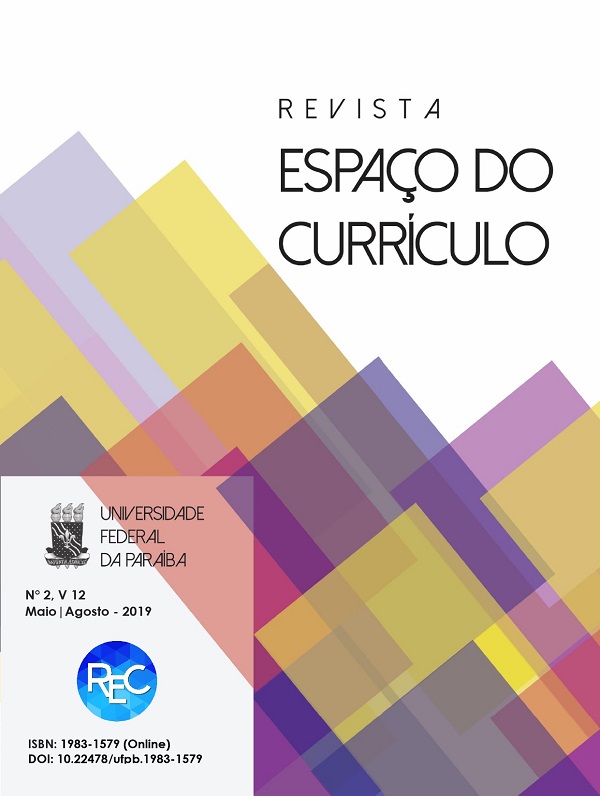THE BNCC KEY EDUCATION
proposal of a curriculum against the knowledge
DOI:
https://doi.org/10.22478/ufpb.1983-1579.2019v12n2.43516Keywords:
National Common Base Curriculum., Elementary School., Curriculum.Abstract
This article has the objective of presenting a documental analysis of elementary school of the Base Nacional Comum Curricular –BNCC (National Common Base Curriculum –NCBC) from the perspective of Michael Young’s studies. In this regard, at a first moment we present Young’s studies about his curriculum theory and explicit the concepts, powerful knowledge and the knowledge of the powerful. After, we introduce how the elementary school of BNCC is organized, how the school subjects appear and what they indicate to compose the curriculum. Finally, we expose reflections with the purpose of pointing questions and problematize the BNCCenlightened by Young’s studies. We believe that the organization proposed in this article allows comprehending beyond the concepts elaborated by Young and the elementary school BNCC’s structure since it also allows signaling concerns/problematizations that can motivate future studies and researches.
Downloads
Metrics
References
AVELAR, M.; BALL, S. J. Mapping new philanthropy and the heterarchical state: The Mobilization for the National Learning Standards in Brazil. International Journal of Educational Development. UCL Institute of Education, United Kingdom. Disponível
em:https://www.sciencedirect.com/science/article/pii/S0738059317302080?via%3Dihub.Acessado em: 09 de nov. 2018.
CORREA, A.; MORGADO, J. C. A construção da Base Nacional Comum Curricular no Brasil: tensões e desafios. In: Colóquio Luso-Brasileiro de Educação. v.3, 2018, Portugal.. Anais... IV COLBEDUCA. Portugal, 2018. p.1-12
GALIAN C. V. A.; LOUZANO, P. B. J. Michael Young e o campo do currículo: da ênfase no “conhecimento dos poderosos” à defesa do “conhecimento poderoso”. Educação e Pesquisa, v. 40, n. 4, p. 1109-1124, out.-dez. 2014.
MOVIMENTO PELA BASE NACIONAL COMUM (MBNC). Disponível em: http://movimentopelabase.org.br/audiencias-publicas-cne/. Acessado em: 09 de nov.2018.
MOREIRA, A. F.; SILVA, T. T. (Orgs.). Currículo, cultura e sociedade. 7ª Ed. São Paulo: Cortez, 2002.
OCDE. Preparing our youth for an inclusive and sustainable world. [s.l: s.n.]. Disponível em: . Acesso em: 9 de nov. 2018.
SAVIANI, D. Pedagogia histórico-crítica: primeiras aproximações. 8ª ed. Campinas, SP: Autores Associados, 2006.
DELORS, J. Educação: um tesouro a descobrir. Relatório para a UNESCO da Comissão Internacional sobre Educação para o século XXI. São Paulo: Cortez, 1998.
DUARTE, N. As pedagogias do aprender a aprender e algumas ilusões da assim chamada sociedade do conhecimento. Revista Brasileira de Educação. Editora Autores Associados, n. 18, p. 35-40, 2004.
YOUNG, M. A superação da crise em Estudos Curriculares: uma abordagem baseada no conhecimento. In: FAVACHO, A. M. P.; PACHECO, J. A.; SALES, S. R. (Orgs.). Currículo, conhecimento e avaliação: divergências e tensões. 1. ed. Curitiba, PR: CRV, 2013. p. 11-27.
__________. Conhecimento e currículo: do socioconstrutivismo ao realismo social na sociologia da educação. Porto: Porto editora, 2010.
__________. Knowledge and control: new directions for the sociology of education. London: Collier Macmillan, 1971.
__________. O currículo do futuro: da “nova sociologia da educação” a uma teoria crítica do aprendizado. Campinas: Papirus, 2000.
__________. O futuro da educação em uma sociedade do conhecimento: o argumento radical em defesa de um currículo centrado em disciplinas. Revista Brasileira de Educação, v. 16 n. 48, set./dez. 2011.
__________. Para que servem as escolas? Educação e Sociedade. vol. 28, n. 101. Campinas: set./dez. 2007.
__________. Por que o conhecimento é importante para as escolas do século XXI? Cadernos de Pesquisa, v. 46, n.159, p. 18-37 jan/mar. 2016.
__________. Teoria do currículo: o que é e porque é importante. Cadernos de Pesquisa. V. 44, nº. 51, p. 190-202, jan./mar. 2014.
Downloads
Published
How to Cite
Issue
Section
License
By submitting an article to Curriculum Space Journal (CSJ) and having it approved, the authors agree to assign, without remuneration, the following rights to Curriculum Space Journal: first publication rights and permission for CSJ to redistribute this article. article and its metadata to the indexing and reference services that its editors deem appropriate.
















